Pearls of witticism from 'Bo the Blogger: Kushibo's Korea blog... Kushibo-e Kibun... Now with Less kimchi, more nunchi. Random thoughts and commentary (and indiscernibly opaque humor) about selected social, political, economic, and health-related issues of the day affecting "foreans," Koreans, Korea and East Asia, along with the US, especially Hawaii, Orange County and the rest of California, plus anything else that is deemed worthy of discussion. Forza Corea!
Sunday, April 30, 2006
Yellow dust alerts
Thanks to the hwangsa from The Factory to the World (China), the sky is still thick as kyŏja out there, so as a public service, here is USFK's Yellow Dust Alert.
Mrs. Yokota goes to Washington
 The family of Megumi Yokota, kidnapped by North Korean operatives from her town in Japan in 1977 and focibly taken to North Korea where she presumably was made to teach DPRK spies the Japanese language and culture, has gone to the US capital.
The family of Megumi Yokota, kidnapped by North Korean operatives from her town in Japan in 1977 and focibly taken to North Korea where she presumably was made to teach DPRK spies the Japanese language and culture, has gone to the US capital. Sakie Yokota, Megumi's seventy-year-old mother, testified before a US congressional panel, calling for US help and international economic sanctions against North Korea to force it to return Japanese and other abducted nationals—including, one supposes, her daughter's South Korean husband and their North Korea-born child.
The family also met with US President George W. Bush, an act reminiscent of Bush's meeting with former North Korean prisoner Kang Chol-hwan, who later penned "The Aquariums of Pyongyang."
Bush promised Friday to press North Korea to return abductees and respect human rights:
'We strongly will work for freedom so that the people of North Korea can raise their children in a world that's free and hopeful, and so that moms will never again have to worry about an abducted daughter.Along with Megumi's mother and younger brother, Takuya, were four North Korean defectors. These were former military officer Kim Sungmin and a family—a couple and their six-year-old daughter Kim Hanmi—who defected to South Korea via a Japanese consulate in Shenyang, China, in May 2002, in what was a major incident involving the Chinese police rushing into the Japanese consulate—sovereign Japanese territory—in order to retrive the defectors. Japanese Prime Minister famously demanded that China "give us back our North Koreans" (or something like that), something that impressed me about the PM.
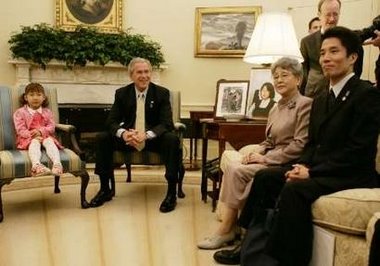
It may be because of the news cycle, but virtually every one of the stories related to the Yokotas' visit that I've seen has been from the Japanese press. Maybe it will appear in the US media, too, but I'm guessing that this is not something that will resonate with many people. Sadly.
The rest of the Kyodo piece I linked to gives a decent overview of the issue as seen from Japan, where Megumi is something of a poster child for kidnap victims. While the official number of abuductees is only sixteen, significantly lower than the number of ROK nationals kidnapped by the North, it is (and should be) a story that has many people in Japan angry and upset.
Saturday, April 29, 2006
Evil people
Sometimes I just scratch my head and wonder what's wrong with some people.
According to Mainichi Daily News, organizers of a photo exhibition featuring pictures of abductee Megumi Yokota have been forced to move the exhibition from its planned location in Sapporo's Marui Imai department store because of a threat that was posted to them. The exhibition was to run from April 26 to May 1.
A letter was sent to the department store's head store in Sapporo on last week, saying, "If (the exhibition) is held, then we will harm customers, business clients and employees." Marui Imai decided to withdraw its offer to host the exhibition after discussing the threat with police, a decision Megumi's parents said they thought was correct.
No new exhibition venue has been decided. The photo exhibition features about a hundred photographs taken by Megumi's father Shigeru Yokota before she was abducted in 1977. It is sponsored by "Asagao no Kai," a committee made up of residents living in the same apartment block as Shigeru Yokota.
Meanwhile, farther south in Yokohama, threatening phone calls were made to the organizers of a play based on Yokota's abduction by North Korean agents, calling for the play to be halted.
The Kamakura-based theatrical group "Tenbin-za" said over twenty suspicious phone calls and e-mails had been received since mid-April. Tenbin-za officials said a male caller had asked, "Are you kindling war (between Japan and North Korea)?" and said, "You'll get no sympathy from me if something happens on the day (of the play)."
A junior high school student is to play the part of Megumi, which has reportedly caused concern among some parents. The theatrical group plans to hold the play as scheduled next month in Yokohama, and will consult local police to discuss security measures.
The obvious suspects in this would be one or more pro-Pyongyang Koreans in Japan, though it isn't entirely implausible that it could be others trying to make the "North" Koreans in Japan look bad.
Whether this is a genuine attempt to intimidate, an attempt by one group to make another look bad, or just a sick joke, it is thoroughly disgusting.
According to Mainichi Daily News, organizers of a photo exhibition featuring pictures of abductee Megumi Yokota have been forced to move the exhibition from its planned location in Sapporo's Marui Imai department store because of a threat that was posted to them. The exhibition was to run from April 26 to May 1.
A letter was sent to the department store's head store in Sapporo on last week, saying, "If (the exhibition) is held, then we will harm customers, business clients and employees." Marui Imai decided to withdraw its offer to host the exhibition after discussing the threat with police, a decision Megumi's parents said they thought was correct.
No new exhibition venue has been decided. The photo exhibition features about a hundred photographs taken by Megumi's father Shigeru Yokota before she was abducted in 1977. It is sponsored by "Asagao no Kai," a committee made up of residents living in the same apartment block as Shigeru Yokota.
Meanwhile, farther south in Yokohama, threatening phone calls were made to the organizers of a play based on Yokota's abduction by North Korean agents, calling for the play to be halted.
The Kamakura-based theatrical group "Tenbin-za" said over twenty suspicious phone calls and e-mails had been received since mid-April. Tenbin-za officials said a male caller had asked, "Are you kindling war (between Japan and North Korea)?" and said, "You'll get no sympathy from me if something happens on the day (of the play)."
A junior high school student is to play the part of Megumi, which has reportedly caused concern among some parents. The theatrical group plans to hold the play as scheduled next month in Yokohama, and will consult local police to discuss security measures.
The obvious suspects in this would be one or more pro-Pyongyang Koreans in Japan, though it isn't entirely implausible that it could be others trying to make the "North" Koreans in Japan look bad.
Whether this is a genuine attempt to intimidate, an attempt by one group to make another look bad, or just a sick joke, it is thoroughly disgusting.
Friday, April 28, 2006
Korean economy in the top ten?
It seems that the falling dollar (or is it the rising won?) may have kicked Korea's GDP into the top ten. But, as the Donga Ilbo opines, any celebration is very muted.
The Donga Ilbo op-ed piece suggests that part of the reason for the subdued response is that the GDP got kicked up to $793 billion last year largely on the weakness of the dollar vis-à-vis the Korean won and many other currencies. I would submit that Korea has also invited bad luck by celebrating such milestones, especially ones starting with '10': not long after Korea cracked the coveted $10,000 per-capita GDP mark, the economy collapsed and declared "moribund" during the 1997 economic crisis.
Korea had stepped into the #11 spot only recently, and estimates of hitting #10 put the date at 2020. Perhaps Korea will slip back down to #11 again. In July, actual purchasing power will replace dollar-related value as the standard for measuring GDP, so the ranking are subject to change.
The op-ed piece gives an example of how the weakened dollar (which dropped 11% from 1144 won in 2004 to 1024 won in 2005) is skewing Korea's results. When measured in dollars, per-capita GNI (gross national income) shot up 14.8 percent, but when measured in won, the increase was only 2.7 percent (from 16.25 million won to 16.69 million won).
The op-ed also suggests that Korea's quality of life is not up to that of a top-ten country anyway, as reflected by a lack of jobs in a too inflexible labor market, ailing public schools, etc.
The Donga Ilbo op-ed piece suggests that part of the reason for the subdued response is that the GDP got kicked up to $793 billion last year largely on the weakness of the dollar vis-à-vis the Korean won and many other currencies. I would submit that Korea has also invited bad luck by celebrating such milestones, especially ones starting with '10': not long after Korea cracked the coveted $10,000 per-capita GDP mark, the economy collapsed and declared "moribund" during the 1997 economic crisis.
Korea had stepped into the #11 spot only recently, and estimates of hitting #10 put the date at 2020. Perhaps Korea will slip back down to #11 again. In July, actual purchasing power will replace dollar-related value as the standard for measuring GDP, so the ranking are subject to change.
The op-ed piece gives an example of how the weakened dollar (which dropped 11% from 1144 won in 2004 to 1024 won in 2005) is skewing Korea's results. When measured in dollars, per-capita GNI (gross national income) shot up 14.8 percent, but when measured in won, the increase was only 2.7 percent (from 16.25 million won to 16.69 million won).
The op-ed also suggests that Korea's quality of life is not up to that of a top-ten country anyway, as reflected by a lack of jobs in a too inflexible labor market, ailing public schools, etc.
Ouch!
As mentioned before, it's always fun to peruse the sitemter.com data, to find out why I'm getting the 1000-per-week hits I am getting. Many of them are still coming from The Marmot's Hole, thanks to his Korea Blog Aggregator, but a lot more are coming in from both Korea-related and non-Korea-related search engine queries.
"Nude Koreans" is still a favorite search, but I'm also getting requests for Japanese-language translations of my posts.
And then there is this little matter that happened this afternoon. While linking on a sitemeter.com-related referral, I somehow ended up with a list The Marmot's sitemeter.com data. This stuff is supposed to be password-protected, but apparently I was linked right to his information.
Now, I must tell you that it was tempting to check out who links to The Marmot and why, but just as my conservative Catholic/Protestant upbringing causes me to instinctively avert my eyes when a woman inadvertently flashes something she doesn't intend, I instantly tried to click away from the list when I realized I might be looking at something private. But I did manage to notice, out of the corner of my eye as the page was morphing into another, one of the engine search links that brought someone to The Marmot's Hole: "electric cattle prods."
"Electric cattle prods" plus "marmot's hole" and a hit is born. What that user is looking for or planning to do, I have no idea. What was it I said about the quality of my readers?
P.S. The Marmot, if you're reading this, rest assured I will remove this post if you think it inappropriate.
"Nude Koreans" is still a favorite search, but I'm also getting requests for Japanese-language translations of my posts.
And then there is this little matter that happened this afternoon. While linking on a sitemeter.com-related referral, I somehow ended up with a list The Marmot's sitemeter.com data. This stuff is supposed to be password-protected, but apparently I was linked right to his information.
Now, I must tell you that it was tempting to check out who links to The Marmot and why, but just as my conservative Catholic/Protestant upbringing causes me to instinctively avert my eyes when a woman inadvertently flashes something she doesn't intend, I instantly tried to click away from the list when I realized I might be looking at something private. But I did manage to notice, out of the corner of my eye as the page was morphing into another, one of the engine search links that brought someone to The Marmot's Hole: "electric cattle prods."
"Electric cattle prods" plus "marmot's hole" and a hit is born. What that user is looking for or planning to do, I have no idea. What was it I said about the quality of my readers?
P.S. The Marmot, if you're reading this, rest assured I will remove this post if you think it inappropriate.
A peace-loving people?
If you've been in Korea for just about any length of time, you have probably heard a KoKo (Korean Korean, as opposed to a kyopo) extol Korea's peace-loving nature, sometimes including the statement that Korea has never invaded another country.
Well, it's true that Korea has not marched its way across East Asia, as neighbors Mongolia, China, and Japan have done, but neither is Korea's nose entirely clean.
The legendary Old Chosŏn Kingdom (Kojosŏn; Gojoseon in the atrocious NAKL) was later succeeded by a Three Kingdoms Period, that included Koguryŏ (Goguryeo), Paekche (Baekje), Shilla (Silla), and Kaya (Gaya). I won't get into a history lesson, but Shilla ended up kicking everyone's asses (with a bit of help from China), creating what we call Unified Shilla, the forerunner of Chosŏn (Joseon) and then modern Korea(s).
I just can't help but think that when the Paekche people—who were largely peace-loving—saw the invading Shillans coming, that they looked longingly at them and said, "Ah, how wonderful! They're coming to unify us!" Actually, many of those who couldn't escape to their allied lands in Japan ended up killing themselves.
Over a millennium later, we have the misnomered Democratic People's Republic of Korea (that's North Korea, for those of you from California) invading the Republic of Korea (the South), resulting in a nasty war that also doubled as a proxy war for Cold War powers. Millions were killed, perhaps more than all other foreign invasions themselves.
Indeed, Koreans are a peaceful people: Koreans only invade themselves.
Even that glib comment may not be correct, depending on how you look at the Three Kingdoms' territorial expansions into Ainu-inhabited lands in Japan. Is it any wonder that the few remaining Ainu are up in Hokkaidō, as far as you could get from Paekche and Shilla and still be in Japan?
And then, of course, there have been the wars in which Korea (or at least some Koreans) have participated, sometimes with willing culpability by Korean authorities, sometimes not.
Just as rulers from China forced Korean workers to build the Great Wall, rulers from China, Mongolians this time, also got Korean manpower support in their efforts to invade and occupy Japan.
If you read books like Max Hastings's "History of the Korean War" or James Clavell's "King Rat," you get a reminder that some of the brutal POW camp guards in the Imperial Japanese ranks were Chōsenjin (Koreans). Some Koreans were later imprisoned or even executed for their mistreatment of Allied prisoners. In fact, about 1% of the total convicted war criminals in the Pacific Theater were Korean, something many Koreans are unaware of.
Two decades later, hundreds of thousands of Koreans were in ROK uniform in Vietnam, helping to hold back communism there. Unlike participation in World War II, this one had the official stamp of Korean approval, with the enthusiastic support of then President Park Chunghee, who assisted the American allies by having at any given time 50,000 ROK troops in Vietnam—far and away the biggest ally that the US had in that war. For South Koreans who had grown up hating communists and loathing the spread of Marxism, it was not a stretch to go away and fight the enemy, although the extra pay they received may have been an added incentive.
As with the Americans, the Korean soldiers' role in Vietnam is marked with controversy and accusations of excessive brutality that led to the deaths of untold numbers of civilians. This was mentioned recently at AsiaPages, where blogger Jodi cites an exchange with one of her readers:
That is, until the 1990s. Just as in Japan there are a number of people of conscience who make sure the people in power do right by the people who suffered at the hands of Japan, there was a growing number of people who were doing the same in Korea regarding Korean transgressions. The 1990s even saw the making of a movie (based on a book) about the Korean experience in Vietnam, the "White Badge" (hayan chŏnjaeng).
More importantly, though, was that Korea's leadership, themselves opposed to many of the actions of Korea's past military regimes, tried to do the right thing:
But if that question is to be asked, it should be asked sincerely and not rhetorically. I'd venture a guess that Jodi's "reader" didn't know much about what has been done in Korea in regards to Korean atrocities in Vietnam, instead just assuming that the answer was little or nothing.
At any rate, the point remains that President Kim Daejung did in fact express regret (which angered a number of veterans, who probably never trusted Kim Daejung to begin with, since he had long been labeled a Communist), and the Vietnamese appear to be satisfied with the sentiment he expressed.
One wonders, though, why people in Vietnam may be satisfied with an expression of regret and not an apology. The first link I gave provides this answer:
Regarding one link in Jodi's post, it should be noted that it is Koreans themselves who were traveling to Vietnam to find evidence of forced sexual servitude of Vietnamese women by Koreans during the war. In fact, the mission leader is Yune Chung-ok, a member of the Korean Council for the Women Drafted for Military Sexual Slavery by Japan, a Comfort Women advocacy group that is demanding that Japan do the right thing on this issue.
Just as it was Japanese historians who demonstrated Japanese government culpability in setting up the Comfort Women corps, it is not surprising that Korean groups would be involved in doing the same regarding any possible Korean culpability when it comes to Korean sodliers involving themselves with Vietnamese forced to provide sex.
Unlike Jodi's reader, I don't think this "weakens" Korea's case against Japan at all. The issue of forced sexual servitude is one of victims and instigators that transcends issues of country-against country. Koreans doing the right thing by digging this up only enhances the case that victims be recognized and treated fairly. As Ms. Yune says, “Many ‘comfort women’ are still haunted by what they suffered in the past and need help.” That goes for whether they are Korean, Vietnamese, Filipina, Dutch, Chinese, etc.
Well, it's true that Korea has not marched its way across East Asia, as neighbors Mongolia, China, and Japan have done, but neither is Korea's nose entirely clean.
The legendary Old Chosŏn Kingdom (Kojosŏn; Gojoseon in the atrocious NAKL) was later succeeded by a Three Kingdoms Period, that included Koguryŏ (Goguryeo), Paekche (Baekje), Shilla (Silla), and Kaya (Gaya). I won't get into a history lesson, but Shilla ended up kicking everyone's asses (with a bit of help from China), creating what we call Unified Shilla, the forerunner of Chosŏn (Joseon) and then modern Korea(s).
I just can't help but think that when the Paekche people—who were largely peace-loving—saw the invading Shillans coming, that they looked longingly at them and said, "Ah, how wonderful! They're coming to unify us!" Actually, many of those who couldn't escape to their allied lands in Japan ended up killing themselves.
Over a millennium later, we have the misnomered Democratic People's Republic of Korea (that's North Korea, for those of you from California) invading the Republic of Korea (the South), resulting in a nasty war that also doubled as a proxy war for Cold War powers. Millions were killed, perhaps more than all other foreign invasions themselves.
Indeed, Koreans are a peaceful people: Koreans only invade themselves.
Even that glib comment may not be correct, depending on how you look at the Three Kingdoms' territorial expansions into Ainu-inhabited lands in Japan. Is it any wonder that the few remaining Ainu are up in Hokkaidō, as far as you could get from Paekche and Shilla and still be in Japan?
And then, of course, there have been the wars in which Korea (or at least some Koreans) have participated, sometimes with willing culpability by Korean authorities, sometimes not.
Just as rulers from China forced Korean workers to build the Great Wall, rulers from China, Mongolians this time, also got Korean manpower support in their efforts to invade and occupy Japan.
If you read books like Max Hastings's "History of the Korean War" or James Clavell's "King Rat," you get a reminder that some of the brutal POW camp guards in the Imperial Japanese ranks were Chōsenjin (Koreans). Some Koreans were later imprisoned or even executed for their mistreatment of Allied prisoners. In fact, about 1% of the total convicted war criminals in the Pacific Theater were Korean, something many Koreans are unaware of.
Two decades later, hundreds of thousands of Koreans were in ROK uniform in Vietnam, helping to hold back communism there. Unlike participation in World War II, this one had the official stamp of Korean approval, with the enthusiastic support of then President Park Chunghee, who assisted the American allies by having at any given time 50,000 ROK troops in Vietnam—far and away the biggest ally that the US had in that war. For South Koreans who had grown up hating communists and loathing the spread of Marxism, it was not a stretch to go away and fight the enemy, although the extra pay they received may have been an added incentive.
As with the Americans, the Korean soldiers' role in Vietnam is marked with controversy and accusations of excessive brutality that led to the deaths of untold numbers of civilians. This was mentioned recently at AsiaPages, where blogger Jodi cites an exchange with one of her readers:
My reader believes that when you add to the outrage following this incident and that of the poor treatment of Korean employers toward their Vietnamese workers, as well as the unforgotten atrocities committed by Korean soldiers during the Vietnam war, it all makes for some very ugly international relations. (He also noted that the war accusations weaken Korea's case against Japan).Sadly, in Korea, the issue of ROK participation in the Vietnam War was something that that generation didn't want to address. Many ROK men lost their lives, many more were maimed by Agent Orange, quite a few suffered post-traumatic stress from what they saw (and maybe what they did) in Vietnam. It was something shameful and unpleasant that most preferred to leave in the past.
That is, until the 1990s. Just as in Japan there are a number of people of conscience who make sure the people in power do right by the people who suffered at the hands of Japan, there was a growing number of people who were doing the same in Korea regarding Korean transgressions. The 1990s even saw the making of a movie (based on a book) about the Korean experience in Vietnam, the "White Badge" (hayan chŏnjaeng).
More importantly, though, was that Korea's leadership, themselves opposed to many of the actions of Korea's past military regimes, tried to do the right thing:
During a visit to Hanoi in 1998, South Korean President Kim Dae-jung expressed regret over Korean actions in the Vietnam War, but he did not apologise. Vietnam responded by saying it sought no apology from any nation that fought on its soil. Long-time Vietnam watchers say Hanoi does not like to highlight specific horrors from decades of wars against the French and then the U.S.-backed South Vietnam.In more recent years, private Korean groups, especially among the so-called "progressives," have gone further:
Some of the memories of atrocities committed during the Vietnam War are being laid to rest today with the opening of a peace park in the south of the country. It has been largely funded by South Koreans through a newspaper, the weekly Hankyoreh 21 or People 21, which has exposed atrocities committed by South Koreans during the war.Given Korea's involvement in Vietnam, I think it's a fair question to ask if Korean authorities, Korean institutions, and Korean individuals are living up to responsibility for atrocities in the same way so many Koreans demand of Japan.
But if that question is to be asked, it should be asked sincerely and not rhetorically. I'd venture a guess that Jodi's "reader" didn't know much about what has been done in Korea in regards to Korean atrocities in Vietnam, instead just assuming that the answer was little or nothing.
At any rate, the point remains that President Kim Daejung did in fact express regret (which angered a number of veterans, who probably never trusted Kim Daejung to begin with, since he had long been labeled a Communist), and the Vietnamese appear to be satisfied with the sentiment he expressed.
One wonders, though, why people in Vietnam may be satisfied with an expression of regret and not an apology. The first link I gave provides this answer:
Carl Thayer, an expert on Vietnam at the Asia-Pacific Center for Security Studies in Hawaii, said the killing of civilians by Koreans had largely faded from view because the Vietnam War was mainly seen as an American war. "Vietnamese propagandists always make a distinction between the American government and the American people,'' he said. "In their view the Vietnam War was a war launched by a wicked government. Koreans, Thais and Australians were all lackeys. "It is easier to point the propaganda finger at one enemy, several only clouds the issue,'' he said.Korea should not be given a free ride on things in which its leadership or its citizens willingly participated. For too long the taboo and shame has kept people silent, but the same people who have brought us the "truth commissions" about military-era cronyism and occupation-era collaboration also want to shed light on this:
A new space for examining the Korean national identity and culture is emerging. A small number of “386” activists and academics is looking inward and confronting the once dormant and tabooed subject of crimes committed by the troops of South Korea’s authoritarian regime outside its national borders. The topic that has generated so much discomfort and tension lately centers on the little-known historical fact that South Korea was a Cold War enemy of Vietnam. It has come to light that the 300,000 Korean troops that fought against North Vietnam from 1964 to 1973 as U.S. “mercenaries” allegedly killed thousands of unarmed Vietnamese civilians.So, yes, the issue is being addressed, and there has been official expression of regret. Arguably, though, more needs to be done, but at the same time, people should know the facts before they start pointing the finger.
The consideration of this taboo topic of the Korean troop actions during the Vietnam War has created new inter-Asian political conflicts and alliances: charged clashes inside South Korea between Korean veterans and activists; [End Page 621] activist-led investigations of Korean troop massacres of Vietnamese civilians; reflection on the role of Korea as a perpetrator, not only as a victim, of war crimes; and cross-national and cross-cultural dialogues between Korean and Vietnamese citizens. The current public discussions at the local and national levels are fraught with controversy, but they are also promising because they may shed light on Korea’s complicated position in the global, neocolonial world, especially its regional position in Asia.
Regarding one link in Jodi's post, it should be noted that it is Koreans themselves who were traveling to Vietnam to find evidence of forced sexual servitude of Vietnamese women by Koreans during the war. In fact, the mission leader is Yune Chung-ok, a member of the Korean Council for the Women Drafted for Military Sexual Slavery by Japan, a Comfort Women advocacy group that is demanding that Japan do the right thing on this issue.
Just as it was Japanese historians who demonstrated Japanese government culpability in setting up the Comfort Women corps, it is not surprising that Korean groups would be involved in doing the same regarding any possible Korean culpability when it comes to Korean sodliers involving themselves with Vietnamese forced to provide sex.
Unlike Jodi's reader, I don't think this "weakens" Korea's case against Japan at all. The issue of forced sexual servitude is one of victims and instigators that transcends issues of country-against country. Koreans doing the right thing by digging this up only enhances the case that victims be recognized and treated fairly. As Ms. Yune says, “Many ‘comfort women’ are still haunted by what they suffered in the past and need help.” That goes for whether they are Korean, Vietnamese, Filipina, Dutch, Chinese, etc.
Confessions of a Bloggo Svengali
Come August, I will be living somewhere else, not just outside of Seoul but outside of Korea, for the first time since I graduated from college in 1990-something. That means I need to get this old apartment ready for someone else to live in. Someone who—as a renter and not an owner—might be less willing to put up with some of the things I am willing to tolerate.
My apartment is so old (it was built in 1980) that it was one of the first 아파트 to be called '아파트.' When I bought the place in August 2002 and threw the tenants out on their asses in December 2002 to make room for me and my 먼 할머니, I had the place gutted and fixed up, replacing the dirty linoleum floor with the wood veneer pre-formed particle board planks that feel and look much better. The dirty, five-year-old wallpaper was replaced by brighter and textured stuff that had a washable silk base. The tiny tub was removed in favor of a walk-in glass shower, I put in countertops and an island with a height appropriate for not inducing chronic debilitating back pain later in life. The tiny veranda was knocked down in favor of a small breakfast nook and a slightly larger bedroom. The flickering fluorescents (there's a good name for a family-friendly quasi-punk band) were tossed and halogens took their place. I installed an American-style washer and dryer, which blows lint out onto the walkway that my neighbors use to get to their abode.
The standard toilet in the small bathroom was removed in favor of a environmentally friendly low-flow toilet. The "interior decorator" (the abrasive husband of a very nice co-worker, who can multi-task talking on a cell phone, writing down important information, looking for something that fell behind the seat, and switching radio stations while driving—even when slightly inebriated) had mismeasured the bathroom, so it was discovered the low-flow toilet would not fit thanks to the arc of the door opening. The low-flow toilet was then replaced with a standard toilet.
Anyway, I made the place quite nice, but after living here a few years, I realize some things need to be changed or upgraded. Time is running out—just over three months—and I need to make a list of things to get "fixed" in this place in what time remains. This list is more for my own benefit than anyone else's, so if you're looking for pithy commentary on Tokto, you'll have to wait. However, I do wlecome suggestions or comments, as well as gentle prodding to get off my ass and get to work on "the list" if you see me wasting any time, say, at Marmot's.
I still plan to post here on my blog, but not Marmot's (maybe not even Lost Nomad). It just takes too much of my time and it attracts unwanted attention. With Marmot's Korea Blog Aggregator, I can still be a link whore. But you all, as my minions, must do your part to keep the hits coming. When you go to Marmot's, Lost Nomad, Asia Pages, Coming Anarchy, or Japundit, feel free to sprinkle links to my relevant posts all over the commentary. You will be rewarded when the revolution comes. (By the way, if you're not sure if you really deserve—or want to be—called a Kushibo minion, the fact that you have read this far down in an obscurely titled, long post that still hasn't gotten to the meat of its purported purpose, then you ARE one of my minions, whether you like it or not. Either that or you're scanning for the word 'minion.')
Oh, here's the list:
1. Replace bathroom sink with sink built in to new counters.
The current sink is nice looking but provides no space underneath for towels. Also, it's too low. I find myself getting down on my knees just to wash my face.
2. Install medicine cabinet with sliding mirrors above the sink.
I need space for my meds. Lots and lots of meds (mostly vitamins, actually).
3. Install a funky shower head system in shower area.
Right now I've got a sprayer on a plastic tube. Who's going to pay a million won a month for that? Right now they have those cool things with all the massage spritzers, plus space to hold your shampoo.
4. Air conditioning.
This place is on the seventh floor and when the front and back windows are open, there is a very cool breeze that negates the need for an A/C. In fact, last summer I didn't even turn on the fan until late July. But in our comfort-me-I'm-slightly-agitated self-absorbed culture, I need to install a 2 million won A/C if I want to get more than 800K won a month on this place. I'm planning to get one of those two-unit set-ups, with the larger one in the living room/kitchen and the other in the big bedroom. The little bedroom (which will double as a computer room) will have to wait.
5. Get the oven fixed.
My electric oven sort of gave out last winter and I haven't had time to get them to come fix it.
6. Get the dishwasher fixed.
I think the Magic dishwasher I bought for this place needs to be sent back to the Hogwarts School.
7. Get a nice computer desk set-up for the small bedroom.
This will be a computer room if the renters are a single person or a couple. I had thought about getting one of those bunk-bed-on-top-of-desk set-ups, but then whoever is sitting at the computer won't be able to enjoy the view of the downtown skyline out the window there (or to see which of our neighbors are walking by and peering in the window). Besides, with the treadmill also in the room, it might be better to have just the desk.
8. Try out Skylife.
The cable TV arrangement sucks here. I think they've got one cable serving all forty units in this building alone. AFN and some of the movie channels (not the pay ones) are barely audible or visible. If I had my own dedicated set-up with the Skylife satellite, it might be better.
9. Install built-in closets in the big bedroom.
These are called 붙박이장 in Korean. They make a lot more sense in a small apartment than a bunch of dressers. They also look nice if you pay enough money.
10. Box up stuff I don't need to take to Hawai'i and put it in storage.
God, I don't even want to think about this one. My worst fear is that I end up leaving all my stuff in the small bedroom and lopping 300K won per month off the rent.
Things I'm debating:
1. A ceiling fan over the bed.
2. A new couch in the small living room.
(Note: this list may be revised later.)
My apartment is so old (it was built in 1980) that it was one of the first 아파트 to be called '아파트.' When I bought the place in August 2002 and threw the tenants out on their asses in December 2002 to make room for me and my 먼 할머니, I had the place gutted and fixed up, replacing the dirty linoleum floor with the wood veneer pre-formed particle board planks that feel and look much better. The dirty, five-year-old wallpaper was replaced by brighter and textured stuff that had a washable silk base. The tiny tub was removed in favor of a walk-in glass shower, I put in countertops and an island with a height appropriate for not inducing chronic debilitating back pain later in life. The tiny veranda was knocked down in favor of a small breakfast nook and a slightly larger bedroom. The flickering fluorescents (there's a good name for a family-friendly quasi-punk band) were tossed and halogens took their place. I installed an American-style washer and dryer, which blows lint out onto the walkway that my neighbors use to get to their abode.
The standard toilet in the small bathroom was removed in favor of a environmentally friendly low-flow toilet. The "interior decorator" (the abrasive husband of a very nice co-worker, who can multi-task talking on a cell phone, writing down important information, looking for something that fell behind the seat, and switching radio stations while driving—even when slightly inebriated) had mismeasured the bathroom, so it was discovered the low-flow toilet would not fit thanks to the arc of the door opening. The low-flow toilet was then replaced with a standard toilet.
Anyway, I made the place quite nice, but after living here a few years, I realize some things need to be changed or upgraded. Time is running out—just over three months—and I need to make a list of things to get "fixed" in this place in what time remains. This list is more for my own benefit than anyone else's, so if you're looking for pithy commentary on Tokto, you'll have to wait. However, I do wlecome suggestions or comments, as well as gentle prodding to get off my ass and get to work on "the list" if you see me wasting any time, say, at Marmot's.
I still plan to post here on my blog, but not Marmot's (maybe not even Lost Nomad). It just takes too much of my time and it attracts unwanted attention. With Marmot's Korea Blog Aggregator, I can still be a link whore. But you all, as my minions, must do your part to keep the hits coming. When you go to Marmot's, Lost Nomad, Asia Pages, Coming Anarchy, or Japundit, feel free to sprinkle links to my relevant posts all over the commentary. You will be rewarded when the revolution comes. (By the way, if you're not sure if you really deserve—or want to be—called a Kushibo minion, the fact that you have read this far down in an obscurely titled, long post that still hasn't gotten to the meat of its purported purpose, then you ARE one of my minions, whether you like it or not. Either that or you're scanning for the word 'minion.')
Oh, here's the list:
1. Replace bathroom sink with sink built in to new counters.
The current sink is nice looking but provides no space underneath for towels. Also, it's too low. I find myself getting down on my knees just to wash my face.
2. Install medicine cabinet with sliding mirrors above the sink.
I need space for my meds. Lots and lots of meds (mostly vitamins, actually).
3. Install a funky shower head system in shower area.
Right now I've got a sprayer on a plastic tube. Who's going to pay a million won a month for that? Right now they have those cool things with all the massage spritzers, plus space to hold your shampoo.
4. Air conditioning.
This place is on the seventh floor and when the front and back windows are open, there is a very cool breeze that negates the need for an A/C. In fact, last summer I didn't even turn on the fan until late July. But in our comfort-me-I'm-slightly-agitated self-absorbed culture, I need to install a 2 million won A/C if I want to get more than 800K won a month on this place. I'm planning to get one of those two-unit set-ups, with the larger one in the living room/kitchen and the other in the big bedroom. The little bedroom (which will double as a computer room) will have to wait.
5. Get the oven fixed.
My electric oven sort of gave out last winter and I haven't had time to get them to come fix it.
6. Get the dishwasher fixed.
I think the Magic dishwasher I bought for this place needs to be sent back to the Hogwarts School.
7. Get a nice computer desk set-up for the small bedroom.
This will be a computer room if the renters are a single person or a couple. I had thought about getting one of those bunk-bed-on-top-of-desk set-ups, but then whoever is sitting at the computer won't be able to enjoy the view of the downtown skyline out the window there (or to see which of our neighbors are walking by and peering in the window). Besides, with the treadmill also in the room, it might be better to have just the desk.
8. Try out Skylife.
The cable TV arrangement sucks here. I think they've got one cable serving all forty units in this building alone. AFN and some of the movie channels (not the pay ones) are barely audible or visible. If I had my own dedicated set-up with the Skylife satellite, it might be better.
9. Install built-in closets in the big bedroom.
These are called 붙박이장 in Korean. They make a lot more sense in a small apartment than a bunch of dressers. They also look nice if you pay enough money.
10. Box up stuff I don't need to take to Hawai'i and put it in storage.
God, I don't even want to think about this one. My worst fear is that I end up leaving all my stuff in the small bedroom and lopping 300K won per month off the rent.
Things I'm debating:
1. A ceiling fan over the bed.
2. A new couch in the small living room.
(Note: this list may be revised later.)
Thursday, April 27, 2006
Quips and responses
I may be going into semi-retirement, but that doesn't mean I can't shoot off an editorial comment here and there or respond when someone calls my name. See the COMMENTS section below for more.
...
...
Wednesday, April 26, 2006
Spy, please.
 Japan has asked North Korea to hand over this man, Sin Guangsu. Tokyo believes Sin helped to abduct a Japanese man named Tadaaki Hara in 1980. Mr. Hara, believed to be dead now, was forty-three years old at the time. Japanese police investigations suggest he was tricked by two men who said they had a job offer for him. It is thought he was kidnapped and taken to North Korea by boat.
Japan has asked North Korea to hand over this man, Sin Guangsu. Tokyo believes Sin helped to abduct a Japanese man named Tadaaki Hara in 1980. Mr. Hara, believed to be dead now, was forty-three years old at the time. Japanese police investigations suggest he was tricked by two men who said they had a job offer for him. It is thought he was kidnapped and taken to North Korea by boat.The seventy-six-year-old Sin, already on an Interpol wanted list and thought to be in North Korea, is wanted by Tokyo for his alleged part in the kidnap of four other Japanese citizens. Japan made the request through diplomatic channels in Beijing as Japan and North Korea do not have diplomatic relations.
Japanese citizens are angry at North Korea for abducting a total of thirteen Japanese citizens in the 1970s and 1980s. The captives were forced to train North Korean spies, to teach them about Japanese language and culture, in some cases so the spies could pose as Japanese nationals.
Pyongyang finally admitted as much in 2002, but only five of the thirteen were returned. Pyongyang said eight others had died.
Japan also issued an arrest warrant for the other of two men accused of carrying out the abduction of Mr. Hara. The second man is an elderly North Korean now living on a South Korean island.
North Korean "saviors" in Time Magazine
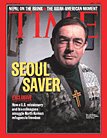 The second-most influential entertainer in the world is not the only Korea-related topic in Time Magazine this week.
The second-most influential entertainer in the world is not the only Korea-related topic in Time Magazine this week.The magazine focuses on the efforts by certain Christian groups to rescue North Korean refugees.
In other religion-related news, a group of South Korean Roman Catholics left for North Korea today, the first such official delegation to visit the religion-suppressing country. South Korean's newly appointed second cardinal, Nicholas Chŏng Chinsuk, is interested in rebuilding the Catholic Church in communist North Korea and having a priest installed there. Chŏng also heads the Roman Catholic diocese in the capital of North Korea, a mostly a symbolic title since there are no officially practicing Catholic priests in the country.
The sixty-one-member delegation from the Archdiocese of Seoul will stay in North Korea until Saturday, inspecting how the more than $10 million it has sent to North Korea for humanitarian aid has been used.
South Korea estimates there are about 3,000 Catholics in North Korea and about 12,000 Protestants, while in the South there are about 4.5 million Catholics.
Refugees from North Korea have repeatedly told human rights groups that some people who tried to practice their religion were thrown into prison camps along with their families then tortured and, in some cases, executed. Among them is Son Jong-nam, whose story is tragic—and all too typical. While noble, the efforts to pressure Pyongyang to stay this man's execution were probably inefficacious.
Here's the beef
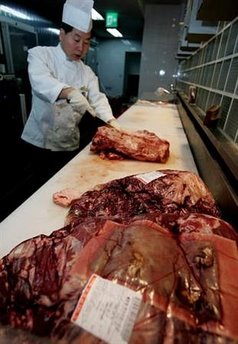 [photo: Beef is yummy. Alternate Simpsonian caption: More testicles mean more iron!]
[photo: Beef is yummy. Alternate Simpsonian caption: More testicles mean more iron!]Is this a sign that the Roh administration is trying to make nice with the Bush administration ahead of the FTA talks?
Korea's Ministry of Agriculture said today that Korea will stick to a plan to resume U.S. beef imports after the government confirmed that the latest U.S. case of mad cow disease was in an animal born before safeguards were put into place.
Safeguards against mad cow disease, such as a ban on using cattle parts in cattle feed, began in April 1998. Scientists say the disease, also known as bovine spongiform encephalopathy (BSE), can be spread through infected cattle feed.
The ministry said that a South Korean team of experts verified the infected U.S. cow was at least eight years old after traveling to the United States to inspect its carcass.
The ministry said it will send final inspection teams soon to review U.S. slaughterhouses and beef packers, a precondition for the resumption of imports. That process will take a couple of weeks, meaning there is no firm date for when shipments would start, but officials said it would not be possible to resume them in May.
From the "Too Much Free Time on Their Hands" department
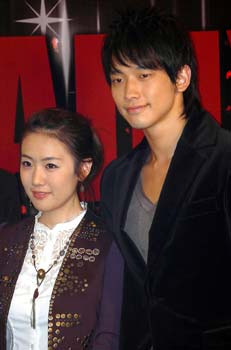 South Korean pop singer Rain (at left with "Star") was ranked the second most influential figure in the global entertainment industry, according to a poll by Time.
South Korean pop singer Rain (at left with "Star") was ranked the second most influential figure in the global entertainment industry, according to a poll by Time.Rain followed director Ang Lee, winner of this year's Academy Award for Best Director for "Brokeback Mountain," who received 34 percent of public support.
The 23-year-old heartthrob often labeled as the Korean Justin Timberlake, garnered 28 percent of public support in an annual poll conducted by the weekly magazine. No word from Time on whether that equates to three rabid Netizens in a basement PC-bang or four.
UPDATE (4/29/2007):
Oh, dear G-d, it's happening again! Time Magazine has again put Mr. Rain on the list of candidates for their Top-100 issue, and fans of Rain have again voted (early and often?) to thrust him up to the dizzying upper echelons of popularity on that list.
As of today, April 29, 2007, Mr. Rain is at #2 with 385,467 votes, just behind Comedy Central's Stephen Colbert and his 235,147 votes (apparently Time's ballots are tallied in Florida).
Now, one might reasonably guess that nationalistic Korean fans may be behind this wild popularity among Time readers (especially if one reads nothing but the Marmot's Hole comment section), but if you take a look at Time's comments section, it would appear that most of Rain's superfan base is made up of people who are not in Korea (and I'm not referring just to Korean-Americans). They are names of people from places around Asia.
Okay, so he's popular across the continent. Still not sure that makes him influential, and one can still ask, "Is he worthy?"
Alternate endings
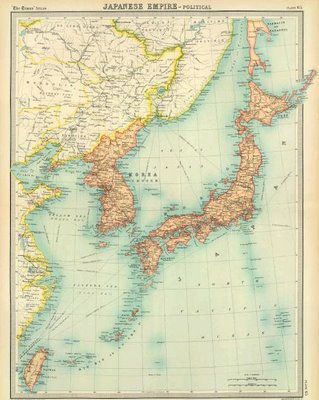
I read a book back in college that mentioned, among other things, that even after defeat in August 1945, the erstwhile Imperial Japanese rulers appealed to the Allies that Japan be allowed to "retain Korea." I recently sought to find a link to this, and while I couldn't immediately find one for a post-Hiroshima/Nagasaki reference, it is clear that Imperial Japan sought to "retain Korea" after the war ended, presumably with their defeat (the link I just provided is also interesting as a 2000 discussion of the same efforts to sanitize past Japanese wrongdoing and legitimize Imperial aggression that we saw later).
In fact, however, even just before the defeat in 1945, Imperial Japan was still committed to a policy of “reserving Korea to Japan,” i.e., retaining Korea as a Japanese colony: these facts are clear from documents made public by the Japanese government. (See the section “Territory to Be Yielded” in the document “Policy on Negotiations with the USSR,” dated May 14, 1945, drawn up by the Supreme War Leadership Council.)++ To ignore these facts and describe Imperial Japan as if it had been a leader in the liberation of the colonies is to distort history, to construct a “modern myth.”My point here is not to dredge that up, since it has long been a matter of public record. Rather, the whole situation got me wondering about what would have happened had a defeated Japan succeeded at "reserving Chōsen (Korea) to Japan."
++The Supreme War Leadership Council was established in August 1944. Its members were the Prime Minister, the Foreign Minister, the Army Minister, the Navy Minister, and the Chiefs of the Army and Navy General Staffs. The Showa Emperor also attended the meetings when important matters were discussed. The section “Territory to Be Yielded” stated that in order to succeed in its negotiations with the U.S.S.R, Japan would need to begin to prepare to return Southern Sakhalin to the Soviet Union, renounce fishing rights there, re-open the Straits of Tsugaru (between Honshu and Hokkaido), and cede Japanese railroad rights in Northern Manchuria; Japan, however, would retain Korea.
There likely would have been no Korean War as we know it, but perhaps there would have been a guerilla war. Maybe a direct confrontation between China and Japan may have erupted by now, dragging the United States in with it. Maybe the United States, being right next door to northern China, would have been in a better position to help defeat the Communists in their battle with the Nationalists, and China would never have been communized.
Would Korea have eventually developed as it has, or would it have remained a backwater for "mainland Japanese" to economically exploit? Would some way have been found—a la the American colony of the Philippines or the British colony of India or the Portuguese colony of Macau or East Timor—for Korea to eventually be free from Japanese rule? What would the country be like? Would it be a land of Japanese-speaking hanbok wearers? Would it be like Okinawa, with much of its indigenous culture gone, replaced by mainland Japanese culture?
Tuesday, April 25, 2006
Diplomatic war? Where have I heard this before?
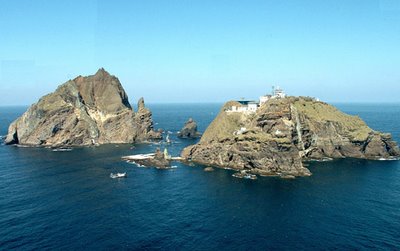 For my thoughts on the current nonsense from Roh's latest salvo, in which he apparently re-declared "diplomatic war," see this post from last spring.
For my thoughts on the current nonsense from Roh's latest salvo, in which he apparently re-declared "diplomatic war," see this post from last spring.ADDENDUM TO POST:
I will write more about this, but I'm hoping that President Roh's horrific unpopularity will work, like a reverse halo effect, to make people take a long, hard, critical look at this stunt. Maybe the people who see that this ham-handed presidential pretender who flubs just about everything other than Korea-Japan relations may have done something pretty stupid with this speech.
AmCham support of Korea entering the Visa Waiver Program
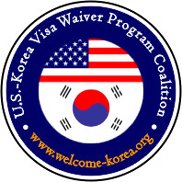 According to the American Chamber of Commerce in Korea, 627,000 Korean visitors to the US in 2004 spent an average of $3500 per trip. Plus over 57,800 Korean students studying in the US, Korean nationals contribute a total of $ 2.2. billion in tourism revenue to the US. A report by the U.S. Department of Commerce predicts these figures could double if Korea entered the US Visa Waiver Program.
According to the American Chamber of Commerce in Korea, 627,000 Korean visitors to the US in 2004 spent an average of $3500 per trip. Plus over 57,800 Korean students studying in the US, Korean nationals contribute a total of $ 2.2. billion in tourism revenue to the US. A report by the U.S. Department of Commerce predicts these figures could double if Korea entered the US Visa Waiver Program. Go here if you would like to support this effort. The website includes an on-line petition.
She blinded me with science

For slightly less than 200,000 won, you can go and get a very thorough check-up at the Korea Association of Health Promotion (한국건강관리협회) in Yongdu-2-dong (and other locations throughout the capital and the rest of the country).
They test for all sorts of problems (more on this later), with blood tests, ultrasound examinations, X-rays, and even stool analysis. Great fun as you enter the assembly line-like process. If you're over thirty, I recommend it. I may even be willing to act as translator for anyone who doesn't speak Korean (the staff there doesn't speak English, apparently).
Bonus points if anyone can tell me what organ this is.
Monday, April 24, 2006
Speak a lot in Camelot
 Reuters has this video clip on Kyŏnggi-do Province's [Gyeonggi] recently opened "English Village" in P'aju [Paju], north of Seoul.
Reuters has this video clip on Kyŏnggi-do Province's [Gyeonggi] recently opened "English Village" in P'aju [Paju], north of Seoul.The emphasis appears to be on English as visitors must pass through what looks like a British fortress to get in. I hope the place is actually heavily fortified, since P'aju is not all that far from the DMZ. I guess they can try to keep the North Koreans away if they insist the DPRK soldiers speak English.
DPRK OFFICER[angrily pointing gun] 문 빨리 열어!
ENGLISH VILLAGE EDUTAINER[slowly, as if speaking to kindergarteners] I'm sorry, can you say that again in English?
DPRK OFFICER[frustrated, and still angry] 문 열으라니까!
ENGLISH VILLAGE EDUTAINER[patiently, with mock look of confusion] I don't understand what you're saying. Try again in English.
DPRK OFFICER[shoots English Village Edutainer]
...
Sunday, April 23, 2006
Tora, tora, tora!
 An inside joke, perhaps, but this configuration of the comments on The Marmot's made me laugh:
An inside joke, perhaps, but this configuration of the comments on The Marmot's made me laugh:Tora, tora, tora! 81
gbevers, gbevers, gbevers [...]
Gerry missed the Day That Will Live in Infamy, but he's still there to do his part to stand up for Imperial Japan (of whom Korea was the greatest ally).
Tokto/Takeshima resolved for now
Well, it looks like Tōkyō's and Seoul's game of chicken is over for now. Emphasis on "for now."
The Washington Post reports Japan is withdrawing its plans for a survey by its Coast Guard of the waters not far from Tokto/Takeshima, and South Korea has agreed to delay plans to submit name proposals for underwater features. Both countries agreed to hold more talks as early as next month on demarcating their sea boundaries, as part of a deal that ended two days of negotiations aimed at easing tensions.
 Japanese Vice Foreign Minister Shotaro Yachi and his delegation made an emergency trip to Seoul last Friday, meeting with South Korean Fice Foreign Minister Yu Myung-hwan [Yu Myŏnghwan] to try to break the impasse triggered by Japan's plan to send survey ships into the disputed waters. South Korea responded twenty gunboats to the area, warning of a possible physical confrontation if Japan proceeded.
Japanese Vice Foreign Minister Shotaro Yachi and his delegation made an emergency trip to Seoul last Friday, meeting with South Korean Fice Foreign Minister Yu Myung-hwan [Yu Myŏnghwan] to try to break the impasse triggered by Japan's plan to send survey ships into the disputed waters. South Korea responded twenty gunboats to the area, warning of a possible physical confrontation if Japan proceeded.
I tend not to write much about Tokto on this blog because it's too much of the same-old-same-old. In fact, much of what I think about the issue can be summed up—with little change—from this year-old post. The Marmot's Hole's comments pages bring some up-to-date insights, but the arguments about who owns what are the same, stale offerings from a year or two ago, usually with the usual suspects.
No point in adding to the din.
But I will say a few points about the most recent round. If, as both the Japanese and the Korean press reported, the Japanese Coast Guard survey does, just like Shimane Prefecture's "Takeshima Day" declaration last year, stem from frustrations by Japanese groups over alleged failure by the Korean government and/or Korean fishers to live up to the 1999 ROK-Japan fisheries agreement, then I think they need to dispense with this kind of tactic and address that issue head-on.
Frankly, I don't know if the complaint by fishermen in Shimane or Tottori Prefectures have any merit. If they do, then it is incumbent upon the Korean side to live up to the forward-looking agreement penned by former ROK President Kim Daejung and former Japanese Prime Minister Keizō Obuchi. But like I said, I don't know, because any legitimate message toward that end is completely washed away by the rising emotions—and not just on the Korean side—intrinsic to a discussion about who holds sovereignty over Tokto/Takeshima.
Ditto with the Japanese government using the Tokto/Takeshima issue to try to prevent Korea from opposing in an international forum the continued international use of the name Sea of Japan for what Korea calls the East Sea. The ratcheting up of tensions serves little useful purpose in addressing those issues to which the Tokto/Takeshima issue is extraneous.
As for South Korea backing down the issue of naming underwater marine features in the East Sea/Sea of Japan, I'm glad to see that the Roh Administration was willing to negotiate and compromise. More importantly, if any of these hydrographic or submarine names are to be changed to something in Korean, I'd rather see it happen after a new administration returns to the McCune-Reischauer Romanization system's rendering of Korean names.
Note for googling purposes: Tokto is also Romanized as Tokdo and Dokdo. It is often referred to as the Liancourt Rocks.
The Washington Post reports Japan is withdrawing its plans for a survey by its Coast Guard of the waters not far from Tokto/Takeshima, and South Korea has agreed to delay plans to submit name proposals for underwater features. Both countries agreed to hold more talks as early as next month on demarcating their sea boundaries, as part of a deal that ended two days of negotiations aimed at easing tensions.
 Japanese Vice Foreign Minister Shotaro Yachi and his delegation made an emergency trip to Seoul last Friday, meeting with South Korean Fice Foreign Minister Yu Myung-hwan [Yu Myŏnghwan] to try to break the impasse triggered by Japan's plan to send survey ships into the disputed waters. South Korea responded twenty gunboats to the area, warning of a possible physical confrontation if Japan proceeded.
Japanese Vice Foreign Minister Shotaro Yachi and his delegation made an emergency trip to Seoul last Friday, meeting with South Korean Fice Foreign Minister Yu Myung-hwan [Yu Myŏnghwan] to try to break the impasse triggered by Japan's plan to send survey ships into the disputed waters. South Korea responded twenty gunboats to the area, warning of a possible physical confrontation if Japan proceeded.I tend not to write much about Tokto on this blog because it's too much of the same-old-same-old. In fact, much of what I think about the issue can be summed up—with little change—from this year-old post. The Marmot's Hole's comments pages bring some up-to-date insights, but the arguments about who owns what are the same, stale offerings from a year or two ago, usually with the usual suspects.
No point in adding to the din.
But I will say a few points about the most recent round. If, as both the Japanese and the Korean press reported, the Japanese Coast Guard survey does, just like Shimane Prefecture's "Takeshima Day" declaration last year, stem from frustrations by Japanese groups over alleged failure by the Korean government and/or Korean fishers to live up to the 1999 ROK-Japan fisheries agreement, then I think they need to dispense with this kind of tactic and address that issue head-on.
Frankly, I don't know if the complaint by fishermen in Shimane or Tottori Prefectures have any merit. If they do, then it is incumbent upon the Korean side to live up to the forward-looking agreement penned by former ROK President Kim Daejung and former Japanese Prime Minister Keizō Obuchi. But like I said, I don't know, because any legitimate message toward that end is completely washed away by the rising emotions—and not just on the Korean side—intrinsic to a discussion about who holds sovereignty over Tokto/Takeshima.
Ditto with the Japanese government using the Tokto/Takeshima issue to try to prevent Korea from opposing in an international forum the continued international use of the name Sea of Japan for what Korea calls the East Sea. The ratcheting up of tensions serves little useful purpose in addressing those issues to which the Tokto/Takeshima issue is extraneous.
As for South Korea backing down the issue of naming underwater marine features in the East Sea/Sea of Japan, I'm glad to see that the Roh Administration was willing to negotiate and compromise. More importantly, if any of these hydrographic or submarine names are to be changed to something in Korean, I'd rather see it happen after a new administration returns to the McCune-Reischauer Romanization system's rendering of Korean names.
Note for googling purposes: Tokto is also Romanized as Tokdo and Dokdo. It is often referred to as the Liancourt Rocks.
Thursday, April 20, 2006
The next president of the Republic of Korea: Han Myŏngsuk
UPDATE (November 2008):
She didn't get the nomination and she didn't switch parties to run. Lee Myung-bak is now president.
On Monday in Seoul (Sunday in the US), Ms. Han announced she is running for president, so my "next president" prediction might still turn out to be true, even if I got the "how" and "why" wrong.
UPDATE (April 30, 2007):
Okay, so the February 25 date has come and gone and not only has Roh not resigned, Han is no longer PM. But she still might be the next president if she runs.
ORIGINAL POST:
I used to care about being the first to break a Korea-related story in the Korea-related blogosphere. I had dreams that my post on the matter would be cited by all the other blogs, and I would gain some legendary status in the blogosphere. Then there would be detractors jealous of my fame or fearful of my influence—some Korean, some kyopo, some crackers—viciously trying to bring me down, even to the point of tracking me down or keying my pimped-out minivan. Then I'd have to use all my AdSense profits to hire body guards. One of them would look like Kevin Costner and try to come on to me. But as I've repeatedly made clear on Space Nakji's blog, I don't swing that way.
Okay, so blog-fame has its price. But anyway, none of this came to any fruition because I usually am NOT acknowledged even when I'm the first to bring something into K-blogdom. I've found, much to my dismay, that I gain notice primarily when I provide profanity-ridden posts that make fun of some group.
So I was not too disappointed that I was not the first to bring news that we in Korea now have our first female prime minister (I say we even though I can't vote, because my taxes pay her salary; besides, nobody really votes for the prime minister anyway).
In fact, being fifth or sixth out the gate on this one, I've realized that it has given me a chance to try a different route. For shorthand purposes, I'm going to call this the Baduk route. It involves making wildly outrageous soothsaying that could end up being true.
Baduk is, as everybody knows, absolutely certifiable. Yet he is well-known, even being written up in the local press, because of his very vocal pronouncement that Dr. Hwang Woo-suk was a fraud. At the time, he was considered nuts, but after Dr. Hwang went down in flames, Baduk was respected. Still considered nuts, but respected—sort of a modern-day Emperor Norton.
 And so I'm going to make such a prediction: Prime Minister Han Myŏngsuk (does she spell her name Han Myung Sook? Not sure, but I'll leave that in there for googling purposes) will be Korea's next president.
And so I'm going to make such a prediction: Prime Minister Han Myŏngsuk (does she spell her name Han Myung Sook? Not sure, but I'll leave that in there for googling purposes) will be Korea's next president.In and of itself, that is not such a profound prognostication, except that I am predicting she will become President sometime next year, most likely in January or February (or possibly December or March). Or more specifically, Acting President.
How she gets there is clear, and it will involve very little work on her part: President Roh Moohyun is going to quit. President Roh is not up for the job, but the fact is that he himself knows it. He tells us this all the time, and just to drive the point home, he proves it on occasion.
President Roh has also made the case that Korea should adopt a different system for its leadership: either the parliamentary system (as in Japan or Britain) where the ruling party or a ruling coalition chooses the Premier (not a President) from amongst themselves; or an American-like presidential system where the President is chosen by the people (directly or indirectly) and serves for a shorter term (e.g., four years) and can stand for re-election.
President Roh seems to prefer the American-style system, and he has said several times that five years is just too long for one person to serve. And again, to drive this point home, he demonstrates the disaster of being stuck with someone for five long years.
President Roh seems to think that it's okay for a presidential incumbent to run again, but that he wouldn't choose that path. Not that the voters would want him to anyway.
President Roh seems to have run because he wanted to prove that a leftist radical could make it to the Blue House. Fine, he's done that. But he also doesn't feel up for being there for five years. In fact, he offered to quit if enough of the public wanted to get rid of him (although it's probably good that he didn't resign during the impeachment, because that would have made it too easy for an opposition to remove a democratically elected leader).
So when the four-year mark on his tenure rolls around (which is February 25, 2007, by the way), expect him to make a "symbolic gesture" in support of his proposal of adopting the American system by resigning. He will resign and Han Myŏngsuk will be Acting President. With the constitutionally determined presidential election scheduled for Novemeber or December of that year anyway, there will be little public support for having Acting President Han replaced in an early election; even if such an election were to go ahead, she will likely be kept in the job anyway, making her a full-fledged President.
This must have great appeal for President Roh. He has been unable to put his mark on anything significant. He is well on his way to tanking Seoul-Tokyo relations, Seoul-Washington relations, but without corresponding improvement of either Seoul-Beijing relations or Seoul-Pyongyang relations. The capital is staying in Seoul, although Seoul will be one-fifth its current size, and Kangnam real estate is still in the stratosphere.
There's nothing left for him to put a positive mark on except effecting a change in the nature of ROK's leadership. Like Ben Kenobi letting Darth Vader strike him down in that first Star Wars flick (the one actually titled "Star Wars"), his self-sacrifice will be what makes him an immortal force in the future. It's just too appealing.
So here's hoping that PM Han can be a competent leader. I already like her for having stated that the Tokto/Takeshima crisis needs to be handled in a cool-headed way. If she does nothing other than temper the childish rantings of the Roh administration, she will be worth her salary. If she can find a way to insert a backbone into the administration when it comes to dealing with Pyongyang and Beijing, while bringing some pragmatism in dealing with Korea's closest allies, Washington and Tokyo, then she deserves a raise.
Oh, and Niels Footman, when Acting President Han is sworn in, let me know the address of the Joongang Daily so I can send you some 8x10 head shots for you to use in your column.
Sunday, April 16, 2006
Reverend Kushibo's Easter message
As one well-known blog lurker knows, I really did set out to go to church today. But as usual on Sundays, I just had too much work to do. Instead, I spent part of the day (while working) with one eye on a cable channel showing "Ben Hur." This movie came out in 1959, well before I was ever born, and I grew up knowing about it but never having watched it ("Casablanca" is another notable flick I have never seen). I finally got a chance to see it in a Korean theater when I was in college, and it was truly amazing, even though I was seeing it decades later.

In some ways, "Ben Hur" is sort of like "Passion of the Christ" meets "2 Fast 2 Furious," but it is still somewhat edifying. At the very least, the movie helped me feel not quite so bad about missing church today.
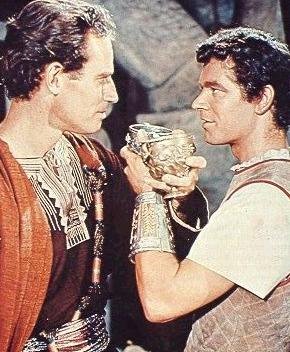 I'll try to go to church next week. Frankly, I think the pastor/priest at whatever religious institution I choose to attend next week will be thrilled to see someone help filling the pews the week after Easter, what with so many people only going to church on Christmas and today.
I'll try to go to church next week. Frankly, I think the pastor/priest at whatever religious institution I choose to attend next week will be thrilled to see someone help filling the pews the week after Easter, what with so many people only going to church on Christmas and today.
Anyway, Happy Easter. Remember what Jesus did, taking on the sins of all humanity, allowing you to act like a jerk for the rest of your life and still probably get into Heaven. But just in case there's a quota on forgivable sins, or just in case Christ gets tired of you taking advantage of Him, stop acting like a jackass, starting today.
UPDATE:
I did go to church today, as I said. How's that for credibility in the blogosphere? I went, sang the hymns under my breath, took Holy Communion, chatted with people, etc. It was nice being back in church.

In some ways, "Ben Hur" is sort of like "Passion of the Christ" meets "2 Fast 2 Furious," but it is still somewhat edifying. At the very least, the movie helped me feel not quite so bad about missing church today.
 I'll try to go to church next week. Frankly, I think the pastor/priest at whatever religious institution I choose to attend next week will be thrilled to see someone help filling the pews the week after Easter, what with so many people only going to church on Christmas and today.
I'll try to go to church next week. Frankly, I think the pastor/priest at whatever religious institution I choose to attend next week will be thrilled to see someone help filling the pews the week after Easter, what with so many people only going to church on Christmas and today.Anyway, Happy Easter. Remember what Jesus did, taking on the sins of all humanity, allowing you to act like a jerk for the rest of your life and still probably get into Heaven. But just in case there's a quota on forgivable sins, or just in case Christ gets tired of you taking advantage of Him, stop acting like a jackass, starting today.
UPDATE:
I did go to church today, as I said. How's that for credibility in the blogosphere? I went, sang the hymns under my breath, took Holy Communion, chatted with people, etc. It was nice being back in church.
Statistics don't lie: Whites are 78.6% more racist than the next most racist group
The lactose farts of Hines Ward had barely dissipated from ROK air space when The Marmot's guest blogger Haisan (a decent chap) started a discussion about the horribly misguided and culturally insensitive Bubble Girls, which has quickly deteriorated, as one might expect, into an exercise in race-baiting. Why, oh why can't the cracker-ass gringos, the gooks, and the nips all just get along? Wasn't that the message of 20th-century prophet Rodney King?
 Anyway, I am so sick of stupid-ass White people telling stupid-ass Asian people how it's the Koreans, the Japanese, or the Chinese, or the freakin' Hmong who are the most racist. I'm also sick of stupid-ass Asian people doing the same thing to stupid-ass White people. And I'm really sick of stupid-ass Black people NOT calling everyone else onto the carpet and saying, "You're all a bunch of messed-up, race-baiting muther fuckers."
Anyway, I am so sick of stupid-ass White people telling stupid-ass Asian people how it's the Koreans, the Japanese, or the Chinese, or the freakin' Hmong who are the most racist. I'm also sick of stupid-ass Asian people doing the same thing to stupid-ass White people. And I'm really sick of stupid-ass Black people NOT calling everyone else onto the carpet and saying, "You're all a bunch of messed-up, race-baiting muther fuckers."
So being sick of this and all, I decided to put the matter to rest once and for all. I will use my powers of induction and my high-speed wireless Internet connection to determine conclusively and irrefutably which nationality is the most racist.
My methodology is simple. Racism is difficult to measure, since direct detection requires that people who possess it be very frank and blatant about something which society has most likely taught them is very bad if they possess it in strong doses. Thus, attempts at direct detection would utterly fail unless you're talking to a bunch of racist-and-proud yahoos like the good folks at Stormfront or their Asian counterparts.
 [at left: The logo for Stormfront. I happened across their site one day while searching for do-it-yourself small-business shop maintenance equipment when I mistyped "storefront." While I certainly don't agree with their politics, I do think they have a smart-looking logo. Plus their slogan rhymes. That's bonus points when you're trying to attract an army of simpletons.]
[at left: The logo for Stormfront. I happened across their site one day while searching for do-it-yourself small-business shop maintenance equipment when I mistyped "storefront." While I certainly don't agree with their politics, I do think they have a smart-looking logo. Plus their slogan rhymes. That's bonus points when you're trying to attract an army of simpletons.]
There are indeed some individuals who will openly acknowledge their racist tendencies. Americans are no longer taught that their country is the light of democracy, but rather that it is the bane of all other nationalities, so finding Americans who think they might harbor latent racism is like shooting fish in a barrel. Many Koreans and Japanese will also acknowldge their feelings of racial superiority, some of them—dismayingly—with a great amount of pride.
But since most other nationalities, like the Algerian-abusing French, the Irish-abusing Brits, the Maori-abusing New Zealanders, the American-abusing Canadians, etc., etc., are resolute in their belief that their shit don't stink, it wouldn't be fair to self-loathing Americans to rely on self-reporting of racist viewpoints.
Thus, we are left with detecting racism indirectly (i.e., measuring the racism-infused perceptions of the recipients of racism). In some ways, this is preferable anyway, because many people are racist without knowing it, so even if they were to be honest, they would not be forthcoming about their own racism. That's why we need others to tell us they are racist. For example, my sixty-something mother still uses terms such as "Negro" and occasionally "Colored," and not just when talking about the United Negro College Fund or the National Association for the Advancement of Colored People (which she does often).
These terms were on their way out when our family moved out of Compton, California, back when I was in elementary school (we were the last non-Black family living on our block; I think they even gave us a plaque). My sweet mother does not mean anything racist by referring to our Negro neighbors back on Gale Avenue, which is why we need real-life Black people to definitively inform us that she is, indeed, racist. (And they might be right: my mother does tend to remember to lock her car doors about 1.3 seconds after seeing a Black youth walking down the street in Orange County, whereas it takes her about 2.1 seconds upon seeing a White youth in the same situation. With Asian youth, she will typically offer them a ride.)
So asking minorities what groups are racist against them is far and away the best method for determining racism. Fortunately, everybody is now a minority, so everyone can play. Even in places where White people are a majority, like the United States for example, the perception that they are being overwhelmed by other groups is good enough for them to claim minority status. Because being a minority is a state of mind more than a statistical state. And if we go to the macro-level anyway, the global planet, no one race is more than 50% of the Earth's population.
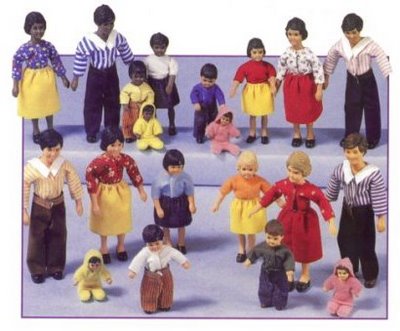 I will use a comprehensive source to mine for stated opinions on racist experience. This is actually quite simple using Google, which has cached every single thing ever uttered on-line. By searching for the string "[plural form of nationality] are the most racist," we can count the number of times such a sentence was uttered and saved for on-line viewing.
I will use a comprehensive source to mine for stated opinions on racist experience. This is actually quite simple using Google, which has cached every single thing ever uttered on-line. By searching for the string "[plural form of nationality] are the most racist," we can count the number of times such a sentence was uttered and saved for on-line viewing.
Now granted, this will not include all instances of someone thinking such-and-such group is indeed racist, but who cares? It's a sampling. Just like with statistical samples, in which we can't interview everyone, we can assume that those who think that "Tibetans are the most racist" are just as likely to go on-line to present that opinion as those who think that "Mongolians are the most racist."
The results are as interesting as they are shocking. As of April 2006:
Whites are the most racist: 945 hits (includes "Whites," "White people," "Honkies," and "Gringos")
Blacks are the most racist: 529 hits (includes "Blacks" and "Black people")
Americans are the most racist: 233 hits
Japanese are the most racist: 217 hits
Asians are the most racist: 138 hits (includes search for "Orientals")
Chinese are the most racist: 99 hits
Koreans are the most racist: 96 hits
Mexicans are the most racist: 37 hits
British are the most racist: 20 hits (search includes "English" and "Brits")
French are the most racist: 20 hits
Germans are the most racist: 11 hits
Hispanics are the most racist: 9 hits
Vietnamese are the most racist: 9 hits
Italians are the most racist: 5 hits
Canadians are the most racist: 4 hits (two of which were duplicates)
Mongolians are the most racist: zero hits
Eskimos are the most racist: zero hits (Inuit were included in the search, because it's racist to call Inuit "Eskimos")
I thought about subtracting hits for statements like "Niggers/Gooks/Japs are the most racist" (8, 1, and 43 hits respectively), but I quickly realized that would involve a lot of math.
I only searched for racist tendencies in around a dozen nationalities because, well, to be honest, the other 183 nationalities just don't count. If you don't like it, sue me. We'll just see if someone who looks like you can get anywhere in the court system in my country.
Anyway, there you have it: White people are the most racist. 78.6% more racist than Blacks, the second most racist group. And Whites are 9.8 times more likely to be racist than Koreans are, so let's just bury that old chestnut once and for all.
Since the number of hits for White people being racist far exceeds that of Americans being racist, I'm assuming that White Kiwis, Aussies, Brits, the Irish, most Western Europeans, and the Cannucks are all running around acting like racist crackers. The Canadians, in particular, I suspect of running around pretending to be American when they're lording their Whiteness over people of Color.
So this should settle things once and for all. I hope you mooks all realize what a great service I've done, since surveys have shown that a whopping 17.3% of all Internet discussions are about who is the most racist. Hopefully this will free people up to talk about more substantive things.
Next week: Who is most passive-aggressive... (Hint: It's the Japanese.)
 Anyway, I am so sick of stupid-ass White people telling stupid-ass Asian people how it's the Koreans, the Japanese, or the Chinese, or the freakin' Hmong who are the most racist. I'm also sick of stupid-ass Asian people doing the same thing to stupid-ass White people. And I'm really sick of stupid-ass Black people NOT calling everyone else onto the carpet and saying, "You're all a bunch of messed-up, race-baiting muther fuckers."
Anyway, I am so sick of stupid-ass White people telling stupid-ass Asian people how it's the Koreans, the Japanese, or the Chinese, or the freakin' Hmong who are the most racist. I'm also sick of stupid-ass Asian people doing the same thing to stupid-ass White people. And I'm really sick of stupid-ass Black people NOT calling everyone else onto the carpet and saying, "You're all a bunch of messed-up, race-baiting muther fuckers."So being sick of this and all, I decided to put the matter to rest once and for all. I will use my powers of induction and my high-speed wireless Internet connection to determine conclusively and irrefutably which nationality is the most racist.
My methodology is simple. Racism is difficult to measure, since direct detection requires that people who possess it be very frank and blatant about something which society has most likely taught them is very bad if they possess it in strong doses. Thus, attempts at direct detection would utterly fail unless you're talking to a bunch of racist-and-proud yahoos like the good folks at Stormfront or their Asian counterparts.
 [at left: The logo for Stormfront. I happened across their site one day while searching for do-it-yourself small-business shop maintenance equipment when I mistyped "storefront." While I certainly don't agree with their politics, I do think they have a smart-looking logo. Plus their slogan rhymes. That's bonus points when you're trying to attract an army of simpletons.]
[at left: The logo for Stormfront. I happened across their site one day while searching for do-it-yourself small-business shop maintenance equipment when I mistyped "storefront." While I certainly don't agree with their politics, I do think they have a smart-looking logo. Plus their slogan rhymes. That's bonus points when you're trying to attract an army of simpletons.]There are indeed some individuals who will openly acknowledge their racist tendencies. Americans are no longer taught that their country is the light of democracy, but rather that it is the bane of all other nationalities, so finding Americans who think they might harbor latent racism is like shooting fish in a barrel. Many Koreans and Japanese will also acknowldge their feelings of racial superiority, some of them—dismayingly—with a great amount of pride.
But since most other nationalities, like the Algerian-abusing French, the Irish-abusing Brits, the Maori-abusing New Zealanders, the American-abusing Canadians, etc., etc., are resolute in their belief that their shit don't stink, it wouldn't be fair to self-loathing Americans to rely on self-reporting of racist viewpoints.
Thus, we are left with detecting racism indirectly (i.e., measuring the racism-infused perceptions of the recipients of racism). In some ways, this is preferable anyway, because many people are racist without knowing it, so even if they were to be honest, they would not be forthcoming about their own racism. That's why we need others to tell us they are racist. For example, my sixty-something mother still uses terms such as "Negro" and occasionally "Colored," and not just when talking about the United Negro College Fund or the National Association for the Advancement of Colored People (which she does often).
These terms were on their way out when our family moved out of Compton, California, back when I was in elementary school (we were the last non-Black family living on our block; I think they even gave us a plaque). My sweet mother does not mean anything racist by referring to our Negro neighbors back on Gale Avenue, which is why we need real-life Black people to definitively inform us that she is, indeed, racist. (And they might be right: my mother does tend to remember to lock her car doors about 1.3 seconds after seeing a Black youth walking down the street in Orange County, whereas it takes her about 2.1 seconds upon seeing a White youth in the same situation. With Asian youth, she will typically offer them a ride.)
So asking minorities what groups are racist against them is far and away the best method for determining racism. Fortunately, everybody is now a minority, so everyone can play. Even in places where White people are a majority, like the United States for example, the perception that they are being overwhelmed by other groups is good enough for them to claim minority status. Because being a minority is a state of mind more than a statistical state. And if we go to the macro-level anyway, the global planet, no one race is more than 50% of the Earth's population.
 I will use a comprehensive source to mine for stated opinions on racist experience. This is actually quite simple using Google, which has cached every single thing ever uttered on-line. By searching for the string "[plural form of nationality] are the most racist," we can count the number of times such a sentence was uttered and saved for on-line viewing.
I will use a comprehensive source to mine for stated opinions on racist experience. This is actually quite simple using Google, which has cached every single thing ever uttered on-line. By searching for the string "[plural form of nationality] are the most racist," we can count the number of times such a sentence was uttered and saved for on-line viewing.Now granted, this will not include all instances of someone thinking such-and-such group is indeed racist, but who cares? It's a sampling. Just like with statistical samples, in which we can't interview everyone, we can assume that those who think that "Tibetans are the most racist" are just as likely to go on-line to present that opinion as those who think that "Mongolians are the most racist."
The results are as interesting as they are shocking. As of April 2006:
Whites are the most racist: 945 hits (includes "Whites," "White people," "Honkies," and "Gringos")
Blacks are the most racist: 529 hits (includes "Blacks" and "Black people")
Americans are the most racist: 233 hits
Japanese are the most racist: 217 hits
Asians are the most racist: 138 hits (includes search for "Orientals")
Chinese are the most racist: 99 hits
Koreans are the most racist: 96 hits
Mexicans are the most racist: 37 hits
British are the most racist: 20 hits (search includes "English" and "Brits")
French are the most racist: 20 hits
Germans are the most racist: 11 hits
Hispanics are the most racist: 9 hits
Vietnamese are the most racist: 9 hits
Italians are the most racist: 5 hits
Canadians are the most racist: 4 hits (two of which were duplicates)
Mongolians are the most racist: zero hits
Eskimos are the most racist: zero hits (Inuit were included in the search, because it's racist to call Inuit "Eskimos")
I thought about subtracting hits for statements like "Niggers/Gooks/Japs are the most racist" (8, 1, and 43 hits respectively), but I quickly realized that would involve a lot of math.
I only searched for racist tendencies in around a dozen nationalities because, well, to be honest, the other 183 nationalities just don't count. If you don't like it, sue me. We'll just see if someone who looks like you can get anywhere in the court system in my country.
Anyway, there you have it: White people are the most racist. 78.6% more racist than Blacks, the second most racist group. And Whites are 9.8 times more likely to be racist than Koreans are, so let's just bury that old chestnut once and for all.
Since the number of hits for White people being racist far exceeds that of Americans being racist, I'm assuming that White Kiwis, Aussies, Brits, the Irish, most Western Europeans, and the Cannucks are all running around acting like racist crackers. The Canadians, in particular, I suspect of running around pretending to be American when they're lording their Whiteness over people of Color.
So this should settle things once and for all. I hope you mooks all realize what a great service I've done, since surveys have shown that a whopping 17.3% of all Internet discussions are about who is the most racist. Hopefully this will free people up to talk about more substantive things.
Next week: Who is most passive-aggressive... (Hint: It's the Japanese.)
A fairy tale
Once upon a time (1998) the leaders of two neighboring lands (Kim Daejung of the Land of Morning Calm and Keizō Obuchi of the Land of the Rising Sun) met and decided that their two great nations should walk hand in hand into the future. This was not an easy proposition, for the leaders of the Land of the Rising Sun had once taken over the Land of the Morning Calm and brutalized many of its people.
 Nevertheless, these two forward-thinking statesmen knew that the best way to look to the future was to take an honest look at the past. It was no small concession for either that they came up with a comprehensive declaration that would light the way to a better tomorrow.
Nevertheless, these two forward-thinking statesmen knew that the best way to look to the future was to take an honest look at the past. It was no small concession for either that they came up with a comprehensive declaration that would light the way to a better tomorrow.
Today, the long ago agreement seems to have been forgotten by the foolish rulers of the two lands. The pendulum of politics is swinging in each land, but for now the pendula are swinging in opposite directions, one to the left and one to the right.
But perhaps the spirit of the agreement is not lost. Maybe some day, the court jester and the man with the man with the flowing locks will be a distant memory, and they will be replaced by sage rulers who realize the two lands make far better friends than they do enemies, as Mssrs. Obuchi and Kim thought not so long ago.
Or is this just a fairy tale?
 Nevertheless, these two forward-thinking statesmen knew that the best way to look to the future was to take an honest look at the past. It was no small concession for either that they came up with a comprehensive declaration that would light the way to a better tomorrow.
Nevertheless, these two forward-thinking statesmen knew that the best way to look to the future was to take an honest look at the past. It was no small concession for either that they came up with a comprehensive declaration that would light the way to a better tomorrow. The two leaders shared the view that in order for Japan and the Republic of Korea to build solid, good-neighborly and friendly relations in the twenty-first century, it was important that both countries squarely face the past and develop relations based on mutual understanding and trust.Sadly, Mr. Obuchi became deathly ill, suffering a stroke and lapsing into a coma, eventually dying. He was replaced by a man said to have "the heart of a flea and the brain of a shark," and his successor's successor seemed to scoff at the plans he had made with his friend, Mr. Kim, who long ago had sought refuge in the Land of the Rising Sun. For his part, Mr. Kim's term of office ended and he was replaced by a man with about as much sense of statecraft as a court jester. Both of these "leaders" chose to pander to nationalistic sentiments, one on the left wing and the other on the right wing, in a bid to bolster their position by seeking support from the vocal fringe.
Looking back on the relations between Japan and the Republic of Korea during this century, Prime Minister Obuchi regarded in a spirit of humility the fact of history that Japan caused, during a certain period in the past, tremendous damage and suffering to the people of the Republic of Korea through its colonial rule, and expressed his deep remorse and heartfelt apology for this fact.
President Kim accepted with sincerity this statement of Prime Minister Obuchi's recognition of history and expressed his appreciation for it. He also expressed his view that the present calls upon both countries to overcome their unfortunate history and to build a future-oriented relationship based on reconciliation as well as good-neighborly and friendly cooperation.
Further, both leaders shared the view that it was important that the peoples of both countries, the young generation in particular, deepen their understanding of history, and stressed the need to devote much attention and effort to that end.
Today, the long ago agreement seems to have been forgotten by the foolish rulers of the two lands. The pendulum of politics is swinging in each land, but for now the pendula are swinging in opposite directions, one to the left and one to the right.
But perhaps the spirit of the agreement is not lost. Maybe some day, the court jester and the man with the man with the flowing locks will be a distant memory, and they will be replaced by sage rulers who realize the two lands make far better friends than they do enemies, as Mssrs. Obuchi and Kim thought not so long ago.
Or is this just a fairy tale?
Saturday, April 15, 2006
Stand by me
During most of my adult experience in Korea, I have had some sort of association with the US military community in Yongsan. Anyone who knows my views knows that I am a big supporter of the US military presence in Korea and in the region, and I've been proud to offer my time and whatever skills I could, typically for low or no remuneration. During most of that time, I've avoided talking with USFK personnel about political issues other than those directly related to Korea or Japan. Unless they brought it up first, in which case I would still hold my tongue on non-Korea or non-Asia-related issues.
Despite my tight-lippedness, the USFK personnel—particularly soldiers themselves—often bring things up themselves.
In 2004, most of the people (roughly a two-to-one majority) I knew were mostly in support of Bush, but there were some people I knew who could get a little outspoken about their criticisms of the war—particularly about why we went in in the first place and/or how it was being handled.
Frankly, I was surprised that anyone in uniform would say anything negative about the war. If AFN (American Forces Network) info spots are to be believed, this is a big no-no, potentially a court-martialable offense.
But as time went on, the two-to-one gradually slipped to one-to-one, and the critics became even more and more outspoken. Sometimes I couldn't get them to shut up.
My own views are along the lines that we are in a you-broke-it-you-bought-it situation, making a quick pull-out the wrong thing to do. I haven't really met any who thinks we need to get out now, but I hear a lot of people telling me they think that the war has been mishandled for the most part. And it scares some of them. I guess it's one thing to get shot at while fighting for a good cause, but something entirely different when you're getting shot at due to incompetent decisions from the leadership.
At any rate, it really didn't come as any surprise to me that six retired generals have spoken out against Defense Secretary Donald Rumsfeld's handling of the war in Iraq and, as the BBC describes it, apparent disdain for experienced military commanders. From the BBC:
On the other hand, if what is often said about President George W. Bush's leadership is to be believed, it doesn't really surprise me that Bush has assured Rumsfeld of his "full support" in the wake of that criticism.
While Bush praised Rumsfeld for his "energetic and steady leadership" during his years at the Pentagon, Rumsfeld fired back at his attackers, telling Arabic TV channel al-Arabiya:
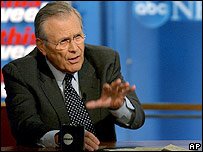 Rumsfeld twice offered to resign in the wake of the 2004 uproar over the Abu Ghraib prison scandal, but Bush refused to accept. He stressed that under Rumsfeld's guidance, the US military has undergone a period of rapid transformation and faced a series of major overseas conflicts.
Rumsfeld twice offered to resign in the wake of the 2004 uproar over the Abu Ghraib prison scandal, but Bush refused to accept. He stressed that under Rumsfeld's guidance, the US military has undergone a period of rapid transformation and faced a series of major overseas conflicts.
Naturally, Democrats have seized on Bush's statement of support, comparing them with the praise he gave to former FEMA head Michael Brown over his handling of the Hurricane Katrina aftermath. Despite Bush's statements of support, Brown was forced out of office after harsh criticism of the government's response to the disaster.
Rumsfeld is not without supporters in the military. According to the BBC report, retired Marine Lt. General Mike DeLong, who was deputy commander of Central Command as the US military prepared to invade Iraq in March 2003, has said Rumsfeld was good at his job.
Despite my tight-lippedness, the USFK personnel—particularly soldiers themselves—often bring things up themselves.
In 2004, most of the people (roughly a two-to-one majority) I knew were mostly in support of Bush, but there were some people I knew who could get a little outspoken about their criticisms of the war—particularly about why we went in in the first place and/or how it was being handled.
Frankly, I was surprised that anyone in uniform would say anything negative about the war. If AFN (American Forces Network) info spots are to be believed, this is a big no-no, potentially a court-martialable offense.
But as time went on, the two-to-one gradually slipped to one-to-one, and the critics became even more and more outspoken. Sometimes I couldn't get them to shut up.
My own views are along the lines that we are in a you-broke-it-you-bought-it situation, making a quick pull-out the wrong thing to do. I haven't really met any who thinks we need to get out now, but I hear a lot of people telling me they think that the war has been mishandled for the most part. And it scares some of them. I guess it's one thing to get shot at while fighting for a good cause, but something entirely different when you're getting shot at due to incompetent decisions from the leadership.
At any rate, it really didn't come as any surprise to me that six retired generals have spoken out against Defense Secretary Donald Rumsfeld's handling of the war in Iraq and, as the BBC describes it, apparent disdain for experienced military commanders. From the BBC:
In a radio interview Gen Riggs, a former division commander, said it was time for Mr Rumsfeld to go because he fostered an atmosphere of "arrogance" among the Pentagon's top civilian leadership.The six retired generals who have chosen to spoke out recently are Army Major General Charles H. Swannack Jr., Army Major General John Riggs, Army Major General John Batiste, Marine General Anthony Zinni, Marine Lt. General Gregory Newbold, and Army Major General Paul Eaton. Some of these are names you may recognize from the news, such as Zinni, Riggs, and Batiste.
"They only need the military advice when it satisfies their agenda. I think that's a mistake, and that's why I think he should resign," he told National Public Radio (NPR).
On the other hand, if what is often said about President George W. Bush's leadership is to be believed, it doesn't really surprise me that Bush has assured Rumsfeld of his "full support" in the wake of that criticism.
While Bush praised Rumsfeld for his "energetic and steady leadership" during his years at the Pentagon, Rumsfeld fired back at his attackers, telling Arabic TV channel al-Arabiya:
Out of thousands and thousands of admirals and generals, if every time two or three people disagreed we changed the secretary of defense of the United States it would be like a merry-go-round.My first thought on reading this was, are there really thousands and thousands of admirals and generals in the US military, retired or still serving? My second thought was that these "two or three people" (actually, six) who were heavily involved in the US military effort in Iraq may represent a sizable portion of the military brass involved in the war over there (though theirs might still be a minority opinion).
 Rumsfeld twice offered to resign in the wake of the 2004 uproar over the Abu Ghraib prison scandal, but Bush refused to accept. He stressed that under Rumsfeld's guidance, the US military has undergone a period of rapid transformation and faced a series of major overseas conflicts.
Rumsfeld twice offered to resign in the wake of the 2004 uproar over the Abu Ghraib prison scandal, but Bush refused to accept. He stressed that under Rumsfeld's guidance, the US military has undergone a period of rapid transformation and faced a series of major overseas conflicts.Naturally, Democrats have seized on Bush's statement of support, comparing them with the praise he gave to former FEMA head Michael Brown over his handling of the Hurricane Katrina aftermath. Despite Bush's statements of support, Brown was forced out of office after harsh criticism of the government's response to the disaster.
Rumsfeld is not without supporters in the military. According to the BBC report, retired Marine Lt. General Mike DeLong, who was deputy commander of Central Command as the US military prepared to invade Iraq in March 2003, has said Rumsfeld was good at his job.
Days of whines and hosers
April 14, yesterday, was Black Day. For those of you keeping score at home, February 14 was Valentine's Day, when young women in Korea are to buy chocolate or some other romantic gift for the target of their affections (presumably a man).
On March 14, men return the favor and buy chocolate or some other suitable romantic gift for the target of their affections (presumably a woman). This is called "White Day."
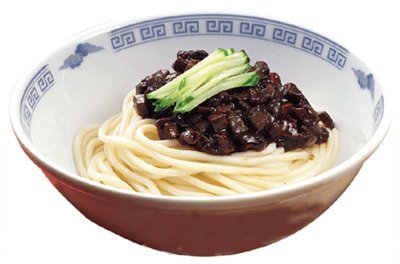
On April 14, men and women who received nothing on the aforementioned days get together and eat jjajangmyŏn, udon-type noodles (myŏn) in a black bean paste called jjajang (most Koreans think jjajangmyŏn is Chinese food, but 99.8% of Chinese have never heard of it).
If the jjajangmyŏn-eaters are lucky, they might hook up with one of the people with whom they are comiserating.
While I didn't end up having jjajangmyŏn with anyone, I did enjoy a heaping plate of "seafood fried rice," which comes with a steaming bowl of jjajang, which you heap on to the rice-and-seafood mixture.
I hooked up with no one (which is probably for the best, since my breath smelled like squid).
Today, April 15, is not only Tax Day in the US (fortunately for us overseas US citizens, we have until June 15 to procrastinate on our tax filings), but also the birthdate of Kim Ilsung [kim ilsŏng], the "Great Leader" who is still the nominal head of the Democratic People's Republic of Korea, despite having died twelve years ago. The North Korean propaganda machine, not wishing their wonderful teacher to be outdone by some lowly self-proclaimed "president-for-life" in some third-rate jungle dictatorship, has declared the Father of North Korean Communism "President-for-Eternity."
North Korea celebrated by threatening everyone within a 3000-kilometer radius.
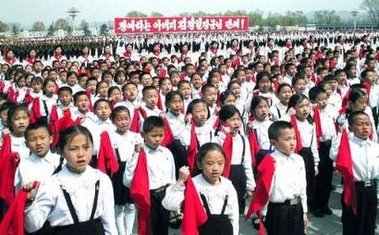
[photo: Children in Pyongyang celebrating the 94th birthday of Kim Ilsung. After reunification occurs, North Korean youth will be recruited by the South to teach Seoul commuters how to wait in line for the bus.]
On March 14, men return the favor and buy chocolate or some other suitable romantic gift for the target of their affections (presumably a woman). This is called "White Day."

On April 14, men and women who received nothing on the aforementioned days get together and eat jjajangmyŏn, udon-type noodles (myŏn) in a black bean paste called jjajang (most Koreans think jjajangmyŏn is Chinese food, but 99.8% of Chinese have never heard of it).
If the jjajangmyŏn-eaters are lucky, they might hook up with one of the people with whom they are comiserating.
While I didn't end up having jjajangmyŏn with anyone, I did enjoy a heaping plate of "seafood fried rice," which comes with a steaming bowl of jjajang, which you heap on to the rice-and-seafood mixture.
I hooked up with no one (which is probably for the best, since my breath smelled like squid).
Today, April 15, is not only Tax Day in the US (fortunately for us overseas US citizens, we have until June 15 to procrastinate on our tax filings), but also the birthdate of Kim Ilsung [kim ilsŏng], the "Great Leader" who is still the nominal head of the Democratic People's Republic of Korea, despite having died twelve years ago. The North Korean propaganda machine, not wishing their wonderful teacher to be outdone by some lowly self-proclaimed "president-for-life" in some third-rate jungle dictatorship, has declared the Father of North Korean Communism "President-for-Eternity."
North Korea celebrated by threatening everyone within a 3000-kilometer radius.

[photo: Children in Pyongyang celebrating the 94th birthday of Kim Ilsung. After reunification occurs, North Korean youth will be recruited by the South to teach Seoul commuters how to wait in line for the bus.]
Welcome, 自由史観研究会 readers!
The people who operate this page have linked to this post. From what I can tell from my limited knowledge of Japanese, aided by Sherlock, they don't agree with the post, which (it appears) they have inaccurately attributed to me (it was written by a US Marine Corps general and a judge).
Anyway, welcome. If I am correct that they oppose my viewpoint and the general's and judge's, kudos to them for at least linking my post with the opposing viewpoint. To be honest, I don't agree with everything the general and the judge write in the chapter anyway, but it's always good to expose oneself to rationally presented contrary ideas.
Anyway, welcome. If I am correct that they oppose my viewpoint and the general's and judge's, kudos to them for at least linking my post with the opposing viewpoint. To be honest, I don't agree with everything the general and the judge write in the chapter anyway, but it's always good to expose oneself to rationally presented contrary ideas.
Friday, April 14, 2006
A tale of two families
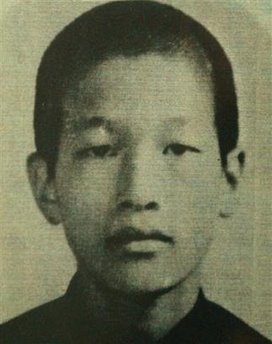 The young man at left is Kim Young-nam [kim yŏngnam, 김영남]. This is a picture of him taken when he was still a kid. I can't show you a picture of him now, as an adult, because in 1978, when he was a high school student, he was kidnapped by North Koreans and forced to live there (a Seoul newspaper alleges that his likely abductor, Kim Gwang Hyun [kim kwanghyŏn, 김광현], is now living in Seoul where he runs a business).
The young man at left is Kim Young-nam [kim yŏngnam, 김영남]. This is a picture of him taken when he was still a kid. I can't show you a picture of him now, as an adult, because in 1978, when he was a high school student, he was kidnapped by North Koreans and forced to live there (a Seoul newspaper alleges that his likely abductor, Kim Gwang Hyun [kim kwanghyŏn, 김광현], is now living in Seoul where he runs a business).Kim Young-nam has been in the news lately because it was determined recently that he was the husband of Megumi Yokota, who as a thirteen-year-old girl was abducted by North Koreans and forced to live in the DPRK. North Korea denies this, saying that Megumi Yokota was married to a North Korean.
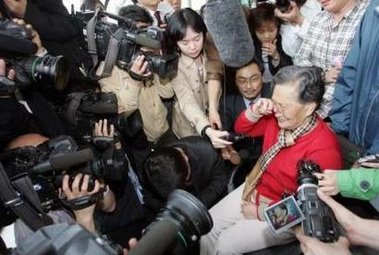
The tearful woman above is the mother of Kim Youngnam. When news came that her son was almost certainly the husband of Megumi Yokota, her son's case, long ignored by both left-leaning and right-leaning ROK administrations, suddenly was all over the press. It's sad and ironic, but were it not for this twist in the tragic tale of poor Megumi Yokota, Kim Youngnam's plight—and that of his family—would have gone unnoticed and unnoted by most in South Korea.
Below is perhaps a better picture, one of Kim Youngnam's mother, Choi Gyewol [choé kyewŏl, 최계월], and Kim Youngnam's sister, Kim Youngja [kim yŏngja, 김영자]. Without the cameras and the microphones in their faces, it is easier to see their anguish. I chose to include the picture above, however, because I thought it was also important to see that this story is big news right now. Despite having collectively ignored the story, the South Korean press, to its credit, is finally addressing the sad situation of dozens of South Koreans like Kim Youngnam, as well as their families.
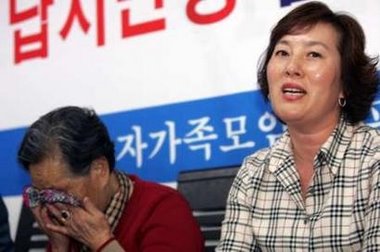
Below is another family, that of Megumi Yokota. Her two brothers, twins Tetsuya and Takuya, and her mother and father, Sakie and Shigeru, do not go a day without thinking about her. When the North Korean government admitted in 2002 that it had kidnapped their daughter (and a dozen other Japanese citizens), they hoped for her release. But almost immediately afterward, they were told she had committed suicide in the DPRK. The Yokota family is holding out hope that this, too, is a lie from the North Koreans, that their daughter is alive somewhere in the North. The fact that a Japanese lab determined that the supposed remains of Megumi Yokota did not match her DNA has given them reason to believe that their dreams of meeting their daughter again might come true.
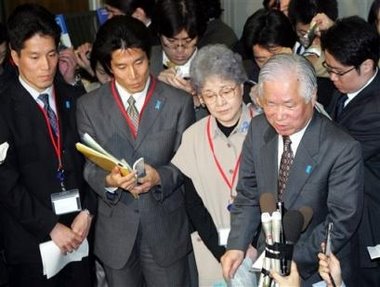
The story of these two families does not end there. Below are two photos of Kim Hae-kyong [kim hyegyŏng, 김혜경], the North Korea-born daughter of Megumi Yokota and, almost certainly, Kim Youngnam. She is still in North Korea, and reportedly is happy to stay there, an ironic thing if it is true. The second picture, it appears, was taken around the time the young Miss Kim gave a blood sample to visiting Japanese authorities.
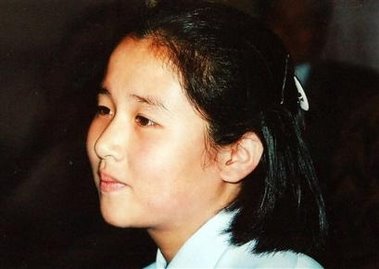
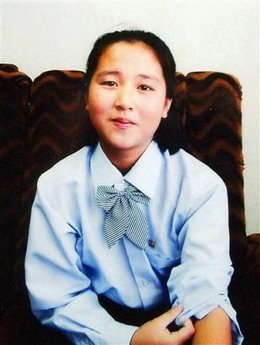 These two families, though utter strangers until this month, are tied together. Not just by their granddaughter (who bears a striking resemblance to her mother) and the marriage between the two reluctant residents of the DPRK. Both families are reminders that North Korea's antics affect many South Koreans and Japanese even today, and these problems must be resolved as well. Perhaps the two families can meet, once in Seoul and once in Tokyo, to make a collective appeal for the ROK and Japanese authorities to get to the bottom of what happened to their daughter and son.
These two families, though utter strangers until this month, are tied together. Not just by their granddaughter (who bears a striking resemblance to her mother) and the marriage between the two reluctant residents of the DPRK. Both families are reminders that North Korea's antics affect many South Koreans and Japanese even today, and these problems must be resolved as well. Perhaps the two families can meet, once in Seoul and once in Tokyo, to make a collective appeal for the ROK and Japanese authorities to get to the bottom of what happened to their daughter and son.
Subscribe to:
Posts (Atom)
